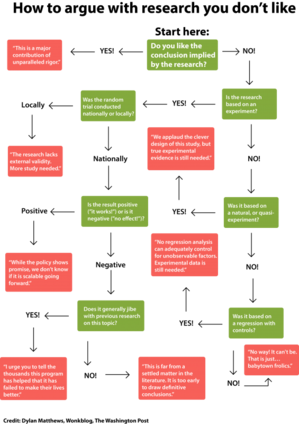A guide for discussing research you don't agree with
Obviously, these arguments are often correct. Experimental studies really are better than quasi-experimental studies which really are better than regression analyses which are certainly better than nothing. Big, broadly representative samples really are better than narrow ones and it is important to have multiple studies back up a conclusion. But given that people tend to read what they want to read in research, these points tend to be used more as bludgeons than as good faith critiques.
Economists do it with models, via Dylan Matthews at the Washington Post:
: just for fun: a handy guide for discussing research you don't agree with.
